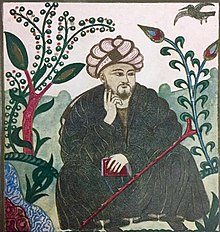Al-Farabi
Al-Farabi (Turkis: Farabi, Arabic: ابو نصر محمد بن محمد الفارابي Abū Naṣr Muḥammad ibn Muḥammad Al Fārābī;[1] for ither recorded variants o his name see ablo), kent in the Wast as Alpharabius[5] (c. 872[2] in Fārāb[3] – atween 14 December, 950 an 12 Januar, 951 in Damascus),[3] wis a Turkic renained filosofer an jurist wha wrote in the fields o poleetical filosofie, metapheesics, ethics an logic.
| Muslim scholar Abū Naṣr Muḥammad ibn Muḥammad Fārābī[1] | |
|---|---|
 | |
| Teetle | The Seicont Teacher[2] |
| Born | c. 872[2] Fārāb on the Jaxartes (Syr Darya) in modren Kazakhstan or Faryāb in Khorāsān (modren day Afghanistan).[1] |
| Died | c. 950[2] Damascus[3] |
| Ethnicity | Turkic |
| Era | Islamic Golden Age |
| Releegion | Islam |
| Main interest(s) | Metapheesics, Poleetical filosofie, law, Logic, Muisic, Science, Ethics, Mysticism,[2] Epistemology |
| Notable wirk(s) | kitāb al-mūsīqī al-kabīr ("The Great Beuk O Muisic"), ārā ahl al-madīna al-fāḍila ("The Virtuous Ceety"), kitāb iḥṣāʾ al-ʿulūm ("On The Introduction O Knawledge"), kitāb iḥṣāʾ al-īqā'āt ("Clessification O Rhythms")[2] |
References
eedit- ↑ a b c Gutas, Dimitri. "Farabi". Encyclopædia Iranica. Retrieved 4 Apryle 2010.
- ↑ a b c d e f g Corbin, Henry; Hossein Nasr; Utman Yahya (2001). History of Islamic Philosophy. Kegan Paul. ISBN 978-0-7103-0416-2.[verification needit]
- ↑ a b c d Dhanani, Alnoor (2007). "Fārābī: Abū Naṣr Muḥammad ibn Muḥammad ibn Tarkhān al‐Fārābī". In Thomas Hockey; et al. (eds.). The Biographical Encyclopedia of Astronomers. New York: Springer. pp. 356–7. ISBN 978-0-387-31022-0. (PDF version)
- ↑ Brague, Rémi; Brague, Remi (1998). "Athens, Jerusalem, Mecca: Leo Strauss's "Muslim" Understanding of Greek Philosophy". Poetics Today. 19 (2): 235–259. doi:10.2307/1773441. ISSN 0333-5372. JSTOR 1773441.
- ↑ Alternative names an translations frae Arabic include: Alfarabi, Farabi, Avenassar, an Abunaser.